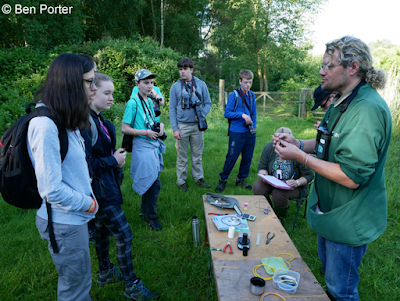Launched in 2016, the BTO
hosted a Young Birders weekend at the BTO Headquarters at the Nunnery Lakes,
Thetford, which was sponsored by the Cameron Bespolka Trust in memory of
Cameron Bespolka. The aim of this event was to bring Young Birders from across
the UK together, and share their enthusiasm towards wildlife with other young
birders they had potentially never met before. After the success of 2016, the
Birdcamp was launched again in May 2017, where it was once again sponsored by
the Cameron Bespolka trust, and hosted by the BTO in Thetford.
The Friday evening was the
first day of the Birdcamp, where the young birders were able to introduce
themselves to each other, before being given a briefing of the weekend and
moving to the campsite.
An early start was in order
for Saturday, where there were multiple activities hosted on the BTO’s Nunnery
Lakes reserve. These included bird ringing, nest recording, Common Bird Census
(CBC) Survey and a general birding group. These were all very successful as
they provided all of the young birders with some new skills, particularly from
the ringing and nest recording activities.
 |
| Bird ringing demonstration at BTO Bird Camp 2017 |
From my perspective, in
2016, I was a participant, whereas in 2017, I was a helper. In 2016, these
activities helped me understand the different methods of conservation work and
how these methods could obtain vital information about the lives of some of the
UK’s bird species, whether they are residential or migrant birds. In 2017,
using the knowledge I had obtained from 2016, I was able to help the young
birders in gaining skills from the mornings activities, so they could become
more successful at finding nests and be more independent with the bird ringing.
On both Birdcamps, the
Saturday afternoon saw us arriving at Lakenheath for an afternoon of birding.
On arrival, we were greeted by Dave Rodgers, the warden of the RSPB reserve,
who gave us an insight to the work that had been done at Lakenheath to maintain
a healthy population of some the UK’s rarest breeding birds (i.e. Bittern,
Marsh Harrier and Bearded Tit). This introduction was given to us in both
years, which I felt was really inspiring, as it gave the young birders an idea
as to the amount of work that has to go in to managing a reserve in order for
it to maintain its habitats, and its population of rare breeding birds. After a
walk around the reserve, we headed back to base in Thetford.
 |
| RSPB warden David Rodgers giving us an introduction to Lakenheath |
An addition to the Birdcamp
in 2017 was that the young birders were treated to two talks; One from Amy Hall
about her experience at the Cornell Bird Observatory in New York from 2016,
where she was given the opportunity to visit here for a week after being
selected by the BTO at the end of the 2016 Birdcamp. The other talk was given
by Ben Porter, from Bardsey Island, where he shared his experiences of living
on the island, and the daily activities he has to complete, including the
ringing of sea birds and working in the bird observatory. Both talks were very
inspirational to the other young birders, so I felt that the addition of talks
from other young birders to the Birdcamp was really successful.
The evening saw us out
looking for Nightjars, with the possibility of being able to ring one. This was
led by Greg Conway, where the young birders we given some interesting
information about the behaviour of Nightjars, including feeding habits and
their migration routes. This part of the Birdcamp weekend is always one of the
best, especially as on both years we have been able to see a Nightjar being
ringed!
 |
| A Nightjar being ringed, photo by Ben Porter |
Sunday morning gave the
young birders the opportunity to visit a Bird Observatory. This happened to be
Landguard Bird Observatory, on the Suffolk coast. One of the main interests
here on both years has been the moth trapping, which has been very successful
both years, with all of the young birders showing major interest. As a helper
in 2017, it was great to see how enthusiastic the young birders were in the
moth trapping, and this theme carried on throughout the weekend with the
introduction of a moth trap at the campsite.
The final part of the
Birdcamp weekend was some birding on the Suffolk coast. On both years, as I
come from Suffolk, I had to ‘lead’ this part, as I was aware as to where to
find some of the target birds we were looking for. On both years, we managed to
see Dartford Warbler, Woodlark and Stonechat, with Redstart in 2016, rounding
off a fantastic weekend.
Being a helper in 2017, I
was able to use the knowledge I had obtained from being a participant in 2016
to help the young birders gain the best out of the weekend. Whether this was
the birds they saw, or how successful they were in the nest recording activity,
or even how many new friends they made over the weekend, I feel like every
young birder from the Birdcamp had an amazing time, and would happily apply for
Birdcamp 2018 in a heartbeat.
Ben Moyes, @Ben_Moyes16
